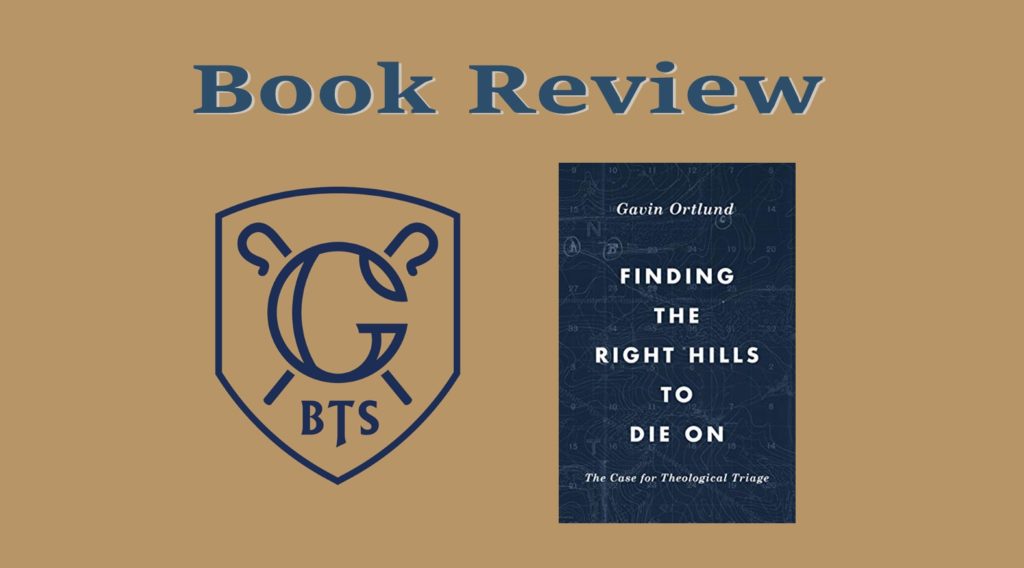
Chris Johnson
The book Finding the Right Hills to Die on by Gavin Ortlund was provided for free by Crossway to GBTS in an exchange for an honest review.
God has placed my family and I upon a path featuring an unusual motley of Christian traditions throughout the years. I was raised an Arminian Baptist, received my high school education at the hands of a largely Fundamentalist group, engaged in a local music ministry with a Charismatic friend, gained Reformed convictions under the ministry and teachings of R.C. Sproul, graduated from a Church of Christ university, and to top it all off, I now attend a paedobaptistic church and a Reformed Baptist seminary simultaneously.
Now certainly, through all of this, God has maintained our family in what may generally be called Calvinistic convictions (though we didn’t know what to call it in our “Arminian” days), shaped and clarified further by broader Reformed convictions. But without a doubt, being around so many individuals—genuine, God-fearing and God-loving Christians—has led me to appreciate God’s providence and shepherding in the lives of all that are His in Christ. I have a great desire, and thus am on a constant quest, to see anywhere that God’s people are unified around the Scriptures at large and the gospel in particular, and to make that unity manifest by rejoicing with them in the truth.
That said, Finding the Right Hills to Die On by Gavin Ortlund seems to be a welcome check to some excesses that are to be found in such ecumenism. In this short book, Ortlund makes a welcome contribution to the pursuit of unity in the Church, focusing upon the key elements to that unity: humility and truth. This he does, perhaps somewhat unexpectedly, by introducing the concept of “theological triage”, termed by Albert Mohler. This careful attempt to differentiate various types of doctrines utilizes four primary categories, in this particular order: first rank doctrines (essential to the gospel), second-rank doctrines (urgent for the health and practice of the church), third-rank doctrines (important to Christian theology without causing congregational or denominational division among Christians), and fourth-rank doctrines (unimportant to our gospel witness, known roughly as adiaphora).
Ortlund stresses that these distinctions are necessary because “equating all doctrines [holding that all doctrines are created equal] leads to unnecessary division and undermines the unity of the church.” (Ortlund, 29). Such attempts at making all convictions equally important, making the types of instrumentation used in worship as worthy a dying-hill as the virgin birth of Christ, lead to the danger of doctrinal separatism. [Perhaps a relevant way to put it would be to say that it is doctrinal social-distancing, only the kind where the leaders lock everyone indoors and no one goes outside.] However, much like Martin Luther’s man on a galumphing horse, we may be tempted to fall too quickly over to the other side, where lies the danger of doctrinal minimalism. Ortlund explains that we cannot simply “stop dividing and just love Jesus”, for in order to do this, “we must define ‘Jesus’”. (Ortlund, 46) And even the “nonessential” doctrines matter, which is why Ortlund is careful to hold that second-rank doctrines are nonetheless still urgent for the church.
With roots in Scottish Presbyterianism, Ortlund later came to credobaptistic convictions through much study, though he is careful to remark on the fact of his enjoyment of and benefit from the Presbyterian churches he attended. Within broader evangelicalism, Ortlund came to Amillennialist and Old-Earth Creationist understandings. These doctrinal convictions, which Ortlund considers secondary in nature, nonetheless proved important as they became stumbling blocks during his pursuit of ordination. On the other hand, Ortlund takes care to note the importance of first-rank doctrines, such as the Virgin Birth and justification by faith. This he does by observing the wisdom of such men as Thoennes and Grudem, with particular interest to the Bible’s clarity, the doctrine’s importance to the gospel, the church’s historical testimony, and the doctrine’s effect upon the present church. (Ortlund, 79). Indeed, not all first-rank doctrines must be affirmed in order for one to be a Christian, though they must certainly not be denied as one grows in wisdom and stature.
Not all second-rank doctrines are a simple matter to work through. Ortlund does well at explaining some of the nuances in second- and third-rank doctrines, noting that these can hold different ranks depending on a variety of factors. He explores the matters of baptism, including the willingness of our forbearers to die upon such convictions, as well as the spiritual gifts, which vary in their importance and exclusion to those that differ in their views. Complementarianism versus egalitarianism, as well as the role of women in the ministry of the church, are also discussed. In the end, Ortlund issues a call for strength, undergirded and surrounded by humility, “not only willing to fight for the truth but also to avoid fighting in order to promote the gospel.” (Ortlund, 144)
Ortlund’s book is a great read, and certainly for those with a desire to see greater unity in the church at large. He stresses well the importance of understanding the serious nature of the doctrines involved, along with the importance of taking our differences seriously, while at the same time noting that not all hills are worth dying on. If the church is to maintain unity in the bond of peace, and certainly if we are to pursue it further, we must think these matters through carefully. To that end, Finding the Right Hills to Die On is most useful.
Chris Johnson is a current student at GBTS.
The corporation shall not discriminate against applicants, employees, students, volunteers, and others on the basis of race, color, nationality, or ethnic origin; however, as a religious institution, the corporation reserves the right to deny or terminate employment or to deny or terminate any other status of persons whose lifestyle, words, actions or otherwise do not align with the corporation’s Statement of Faith, standard of conduct, or other policies of this organization.
